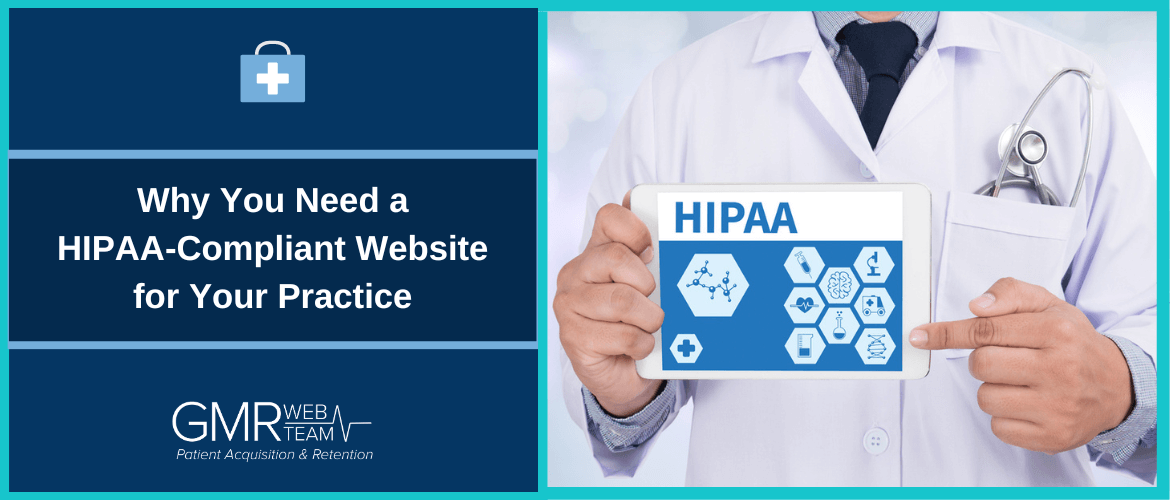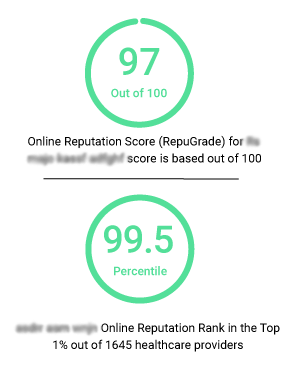Why You Need a HIPAA-Compliant Website for Your Practice

In healthcare, protecting patient information is paramount. This is why the Health Insurance Portability and Accountability Act (HIPAA) was established. HIPAA sets the standard for protecting sensitive patient data, and it's crucial that healthcare providers comply with its regulations. One area that often goes overlooked is a healthcare provider's website.
However, it's just as important to ensure that your website is HIPAA compliant as it is to secure your physical patient records. In this blog, we'll explore the reasons why you need a HIPAA-compliant website for your practice and what steps you can take to ensure that your website is secure.
Understanding What Makes a HIPAA Compliant Website
HIPAA, or the Health Insurance Portability and Accountability Act, is a federal law that sets the standard for protecting sensitive patient health information. HIPAA applies to healthcare providers, health plans, healthcare clearinghouses, and any other entity that handles patient health information, such as insurance and more.
When it comes to websites, HIPAA compliance means that any patient health information that is collected, stored, or transmitted on the website is done so in a secure and private manner. This includes any personally identifiable information (PII) that is collected, such as names, addresses, phone numbers, and medical information.
HIPAA-compliant websites typically have certain features that ensure the security and privacy of patient information. These features may include:
- Encryption of patient data in transit and at rest
- Access controls and user authentication measures
- Regular security risk assessments and vulnerability scans
- Policies and procedures to address data breaches and incidents
- Business associate agreements with any third-party vendors or service providers who may handle patient information
It's important for healthcare providers to ensure that their websites are HIPAA compliant to protect patient information and avoid potential legal and financial consequences.
Why It’s Must to Have a HIPAA-Compliant Website for Healthcare Practices?
A well-established website of a healthcare practice can help establish trust and credibility with potential patients. When someone visits your website, they should be able to find all the necessary information about your practice, such as your location, services offered, credentials, and patient testimonials. By providing transparent and comprehensive information, you can build trust with potential patients and give them a reason to choose your practice over others. However, it's equally important to ensure that the website is HIPAA-compliant to protect patients' sensitive health information.
Let’s explore the reasons why having a HIPAA-compliant website is a must for any healthcare practice, and how it benefits both your practice and your patients.
# Protecting Patient Privacy:
One of the primary reasons for HIPAA compliance is to protect patient privacy. Patient information is sensitive and must be handled with care. A HIPAA-compliant website ensures that patient information is secure, confidential, and not accessible to unauthorized individuals.
# Avoiding Legal and Financial Consequences:
Violating HIPAA regulations can result in significant legal and financial consequences, including fines, lawsuits, and loss of reputation. By having a HIPAA-compliant website, healthcare practices can avoid these consequences and ensure that they are meeting legal requirements
# Building Patient Trust:
Patients are increasingly concerned about the privacy and security of their healthcare information. By having a HIPAA-compliant website, healthcare practices can build trust with their patients by demonstrating their commitment to protecting patient privacy and complying with the law.
# Staying Competitive:
As more healthcare practices move online, having a HIPAA-compliant website can help set a practice apart from its competitors. Patients are more likely to choose a healthcare provider that they trust to protect their privacy and ensure the security of their information.
How to Check/Ensure if Your Website Is HIPAA Compliant or Not
Protecting patient information is crucial for any healthcare organization, and failure to comply with HIPAA regulations can result in hefty penalties and reputational damage. So how can you ensure that your website meets the necessary standards for data security and privacy? Let’s discuss the steps that you can take to check and ensure that your website meets the HIPAA compliance requirements:
# Identify if your website deals with PHI:
Determine if your website collects, stores, or transmits any patient health information.
# Determine level of access to PHI:
Identify who has access to PHI and how it is being used on your website.
# Conduct a risk analysis:
Assess potential security risks and vulnerabilities on your website.
# Implement safeguards:
Establish administrative, physical, and technical controls to protect PHI.
# Train staff:
Educate your staff on proper handling of PHI and security protocols.
# Regularly review and update HIPAA policies:
Keep your policies and procedures up-to-date to maintain compliance.
# Obtain third-party certification:
Consider getting a third-party HIPAA compliance certification to demonstrate adherence to regulations.
# Get an Expert Opinion:
Finally, you can also consult an expert in HIPAA policies to ensure that your website is fully compliant.
How to Make a HIPAA-Compliant Website
Building a HIPAA-compliant website requires superior planning and implementation of security measures to protect patients' sensitive health information. Before you begin designing your website, it's essential to identify the type of information that will be handled on it. This includes personal health information (PHI) and electronically protected health information (ePHI).
# Understand the HIPAA regulations:
Once you've identified the type of information you will be handling, you need to understand the regulations outlined in the HIPAA Privacy and Security Rules. This includes the HIPAA Security Rule, which outlines the technical, physical, and administrative safeguards that must be in place to protect ePHI.
# Use secure web hosting:
Ensure that you use a web hosting provider that offers secure hosting and complies with HIPAA regulations. The web hosting provider should also provide data backups, disaster recovery, and access control mechanisms.
# Secure communication channels:
All communication channels should be secured with encryption, such as Secure Sockets Layer (SSL) or Transport Layer Security (TLS). This ensures that PHI is transmitted securely between the website and the user's device.
# Access controls:
Ensure that users are only given access to the minimum amount of information necessary to perform their job duties. Implement access controls, including unique usernames and passwords, two-factor authentication, and session timeouts.
# Technical safeguards:
Implement technical safeguards such as firewalls, antivirus software, intrusion detection and prevention systems, and automatic software updates. This helps to protect the website and any associated systems from security threats.
# Implement physical safeguards:
Implement physical safeguards such as access controls, video surveillance, and alarm systems to protect physical devices that handle ePHI.
# Develop policies and procedures:
Develop policies and procedures that outline how ePHI will be handled and protected on the website. Ensure that all employees and contractors who handle ePHI are trained on these policies and procedures.
# Sign Business Associate Agreements (BAAs):
Sign BAAs with any third-party vendors who handle ePHI. This ensures that they are also HIPAA compliant and will protect ePHI according to HIPAA regulations.
# Conduct regular risk assessments:
Conduct regular risk assessments to identify potential vulnerabilities and threats to ePHI. This ensures that you can take proactive measures to mitigate these risks and remain compliant with HIPAA regulations.
By following these steps, you can make sure that your website is HIPAA-compliant and meets the necessary security and privacy standards to protect patients' sensitive health information.
Understanding the Five Main HIPAA Compliance Rules
Understanding the five main HIPAA compliance rules is crucial to ensure that your organization meets the necessary standards for data security and privacy. So here are the five main HIPAA compliance rules:
# Privacy Rule:
This rule sets standards for the protection of an individual's health information, including how it can be used, disclosed, and accessed. The Privacy Rule also gives individuals the right to access their own health information, request corrections to their records, and be informed of how their information is being used.
# Security Rule:
This rule establishes standards for the security of electronic health information (ePHI), such as passwords, access controls, and encryption. It requires healthcare organizations to implement administrative, physical, and technical safeguards to ensure the confidentiality, integrity, and availability of ePHI.
# Breach Notification Rule:
This rule requires healthcare organizations to notify affected individuals, the Secretary of Health and Human Services, and, in some cases, the media if there is a breach of unsecured ePHI.
# Omnibus Rule:
This rule combines several HIPAA regulations into a single, comprehensive set of rules. It also expands the definition of business associates to include subcontractors and requires business associates to comply with HIPAA regulations.
# Enforcement Rule:
This rule sets out the procedures for investigating and enforcing HIPAA regulations, including penalties for non-compliance. It also gives individuals the right to file complaints with the Department of Health and Human Services if they believe their rights under HIPAA have been violated.
In conclusion, understanding the five main HIPAA compliance rules is essential for any healthcare organization that deals with protected health information. Failure to comply with these regulations can result in costly penalties and reputational damage. So don't take any chances – ensure that your organization is in full compliance with HIPAA regulations and keep your patients' sensitive information safe and secure.
Choose Us for Expert HIPAA-Compliant Healthcare Solutions
At GMR Web Team, we understand that providing healthcare services comes with unique challenges, particularly when it comes to maintaining a HIPAA-compliant website. That's why we continually advance and enhance our expertise in HIPAA policies to stay up-to-date with its evolution. Our team specializes in secure customizations for HIPAA compliance, giving you an edge in the healthcare industry. Contact us to ensure that your website adheres to HIPAA regulations, and avoid penalties or reputational damage.
Comments are closed


